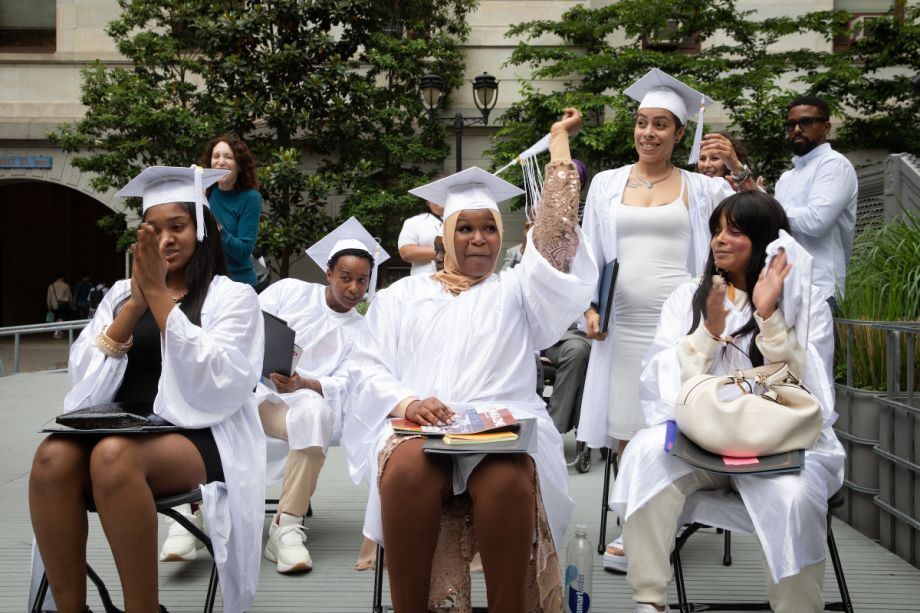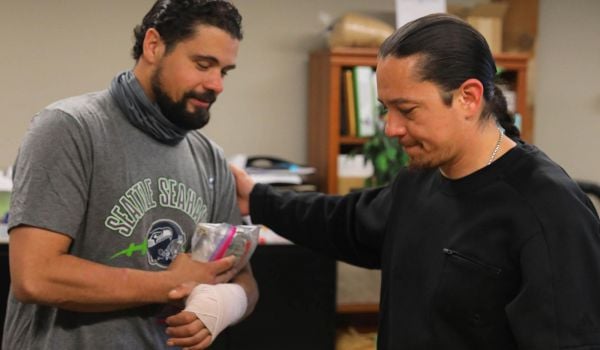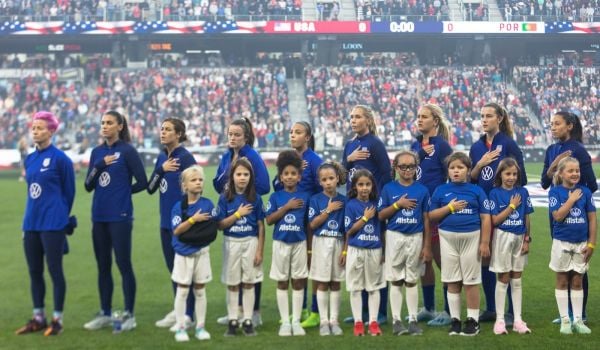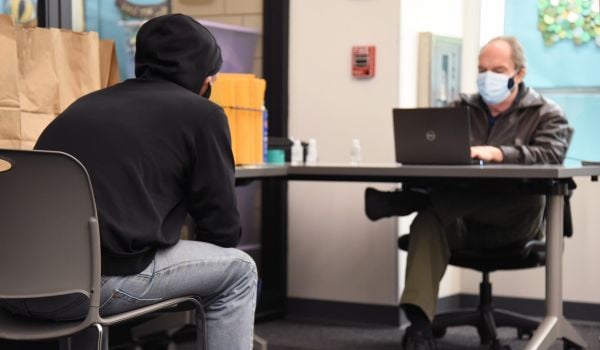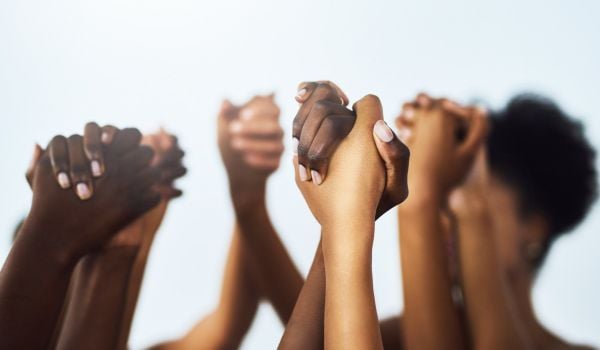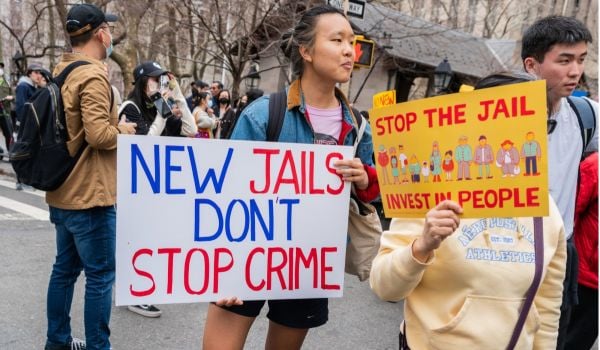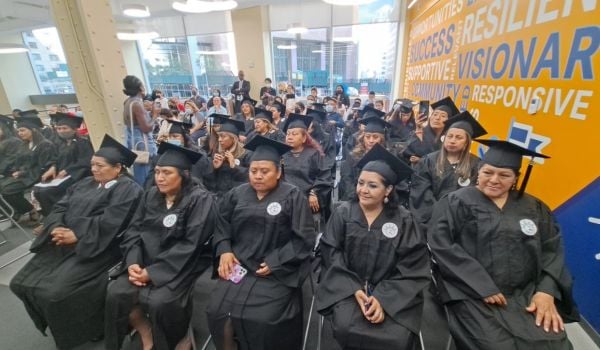December Ablessing Collins is hard to miss in a room. She constantly uses her hands to talk and her bright smile naturally invites conversation. It’s a stark difference, she knows, from who she was in her darkest moments. In 2014, three days before she graduated with a bachelor’s degree in science, her mother died.
She became more responsible for her family then, not just for her career or life goals. “It was just all of that responsibility, just kind of took flight,” she tells Next City. From the emotional burden of losing her mother to suddenly having to take care of her family, she made some poor decisions, hung out with the wrong people, found herself with two felony charges and was incarcerated.
She served a fraction of her sentence, just three months. But the time changed her. Even with the programs meant to rehabilitate incarcerated women within jails, she wasn’t under any illusions. Prison was meant to keep her away from interacting with the rest of society. “Everything was just rules, rules, rules. It’s hard to describe. [Prison] kind of just makes you lazy,” she says.
When she got out, there were other challenges. Her family had nearly abandoned her during her time inside, and the social stigma followed her on the outside. “People were ripping me off,” she says. “People have always expected more of me. I wasn’t valuable to them anymore because I made a mistake.”
She also couldn’t escape her past in her professional life either. “I was going to my McDonald’s job, but I wanted more for myself than fast food and was applying to other jobs. I was like, ‘I have this degree…but I also have this record.’” From 2016-2020 she struggled to find stable employment and housing.
The mental anguish led her to admit herself to a psychiatric hospital. She eventually found a therapist, recommitted to Islam and learned how to cope without medicaton. In 2021, she had just moved out of a shelter and was actively job hunting. As she expected, there were very few programs and employment opportunities available in Philadelphia.
Then she met Rasheeda Bagwell through a supervisor. Earlier in 2021, Bagwell had joined the Philadelphia-based nonprofit Mural Arts Philadelphia through its Restorative Justice Program to lead a new pilot project: The Women’s Reentry Program. Modeled after the nonprofit’s widely successful Guild Program — a reentry apprenticeship for system-impacted people that launched in 2009 — the pilot program was an experimental third branch of the Guild programming. They already have a men’s program as well as a co-ed program. But until 2021, they had nothing designed specifically for women.
For Bagwell, the Women’ Reentry Program helps solve two big problems in Philadelphia: the lack of services for system-impacted women, and more importantly, stopping the cycle of incarceration within multiple generations of the same family.
What causes intergenerational incarceration varies, but in Bagwell’s experience, much of it stems from single-parent families and their need to survey. The Annie E. Casey Foundation estimates that nearly 30% of single-parent households live in poverty. When a parent is gone, Bagwell explains, that financial burden then passes down, because someone always has to bear that responsibility. In Collins’ case, that was her.
Bagwell notes that single mothers are more often driven to desperation and crime when they carry the burden of being the sole financial support for the family, either because they have been incarcerated or the father figure is gone. “Then they’re selling drugs, selling clothes — women are asked to be the backbone of this community.”
Yet despite incarceration’s cyclical nature, there are very few reentry programs tailored to women in Philadelphia. Although men are still incarcerated more than women in Pennsylvania, according to the Vera Insitute, the number of women entering the state’s two women-only prisons (there are 23 prisons in the state total), has grown 966% from 1980. Pennsylvania is also ranked number one in the nation for prison admissions – and shows an increase in admission over time.
The trend is clear to Bagwell and Collins: Increasingly, the face of Pennsylvania’s incarcerated are women.
By some estimates, there are about 50,000 people in Philadelphia actively on probation, about 3% of the city’s population. Though the numbers on gender aren’t broken down, the city of Philadelphia lists 12 programs for reentry specifically for women. “Yeah, we may have fewer women coming home, but they have nothing to come home to,” says Bagwell.
When they were designing the pilot, Kali Silverman, Mural Arts’ Director of Restorative Justice, says the process was intensive. It was partly modeled after existing programs, and had guidance from Able World Consulting, but centered the input of system-impacted women.
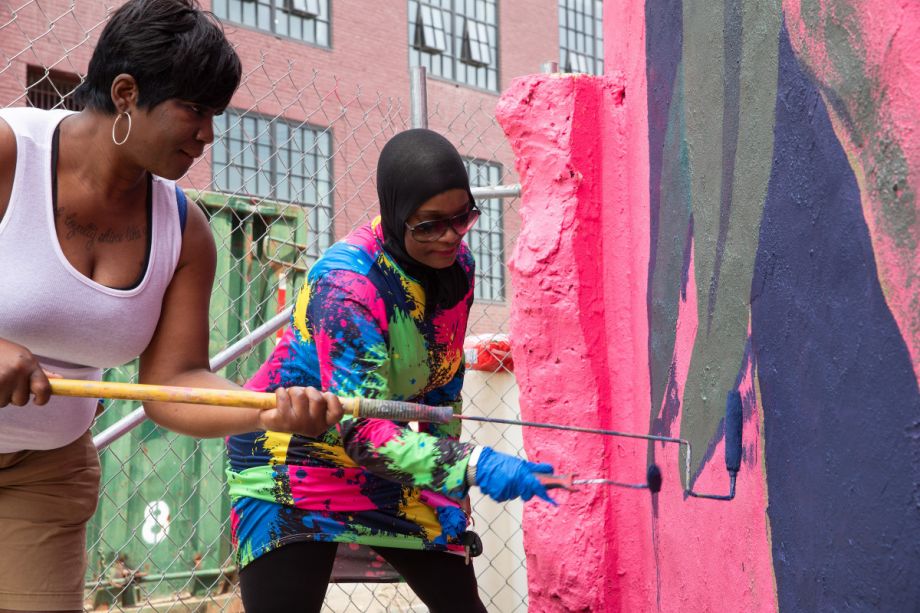
Lead artist Jess X Snow and assistants, including participants from the Women's Guild, work on “The Future Is Worth The Fight” on May 28, 2021. (Photo by Steve Weinik)
One thing that stood out for Silverman in the process was the multiple roles of responsibility women often play in the livelihood of others. So it had to be paid, and it had to be flexible.
“By design, we have to be flexible and we wanted to make sure the time spent here [and] our cohorts would benefit,” says Silverman. “Our goal isn’t just to see them get jobs, but to thrive, and really start their careers.” It’s the reasoning behind the relaxed atmosphere and wages—participants are paid $15 per hour for 20 hours of work per week.
The program itself has two essential components. First there are the creative aspects: mural painting and completing various recreational projects around Philadelphia. “The mural arts teaches them life skills, how to work in teams and communicate with each others,” says Silverman. In its two years, the cohorts of the Women’s Reentry Program have completed six murals and helped with various other projects at 12 recreational centers across the city.
The other part requires workshop attendance. There are more technical workshops on the job searching process, from dressing for an interview to resume-building. But there are also more therapeutic workshops, like yoga. This aspect of the program is important to Bagwelll and Collins because it addresses the emotional process of returning.
“A lot of people don’t understand that when people are in prison, they suddenly don’t have to worry about rent. You don’t have to worry about having a winter coat. You’re worried about if commissary is going to come on time,” said Bagwell. “Coming back is a shock to the system. We can do the business side of things all we want – dress you up and do your makeup for an interview — but if we’re not addressing the trauma, people get stuck in that mindset.”
That mindset is a mixture of fear and apathy. Bagwell has seen people give up on their job search because it isn’t easy. But she speaks about the fear, from experience, as someone who had to serve time for three felonies. She recalls a time when she couldn’t get permission quickly enough from the probation officer to take her child to a field trip to an aquarium in New Jersey. She went anyway, but was fearful the whole time she would get caught. “It’s like you think you’re free, but they make you walk a very fine line.”
The approach of the program has been working well for Collins. She was part of the second cohort, and graduated back in December. She mainly uses writing as her coping mechanism when she’s stressed. “Whether it’s good writing, or bad writing, or imaginative writing, I write it all down,” she says. And she’s found success in her professional life too: She’s now a certified peer specialist, hired with the program.
But Collins does stand out as a natural student. She is a college graduate and before her life was impacted by the carceral system, most of her family and peers viewed her as level-headed and responsible. Not all of Bagwell’s students have that background.
But those cohorts are teachable moments too. Sometimes Bagwell has to stay longer or get up earlier, and every cohort is different. “But the program is getting better and better every time.”
And the numbers seem to bear that out. The pilot is approaching its second year, and the recidivism rate is 0%. In other words, no one from the program is back in jail or prison. All of her alumni, she says, are either employed or haven’t given up on their job searches.
And just by word of mouth, the program has become so popular, that she’s started a first-come-first-serve waitlist that’s growing. To apply to the pilot program, applicants have to be women, at least 18 years old and system-impacted. That’s is a flexible term for Bagwell. They can be like Collins, someone who was incarcerated, or someone who has a parent or partner currently in the carceral system. They currently cannot intake people who are unauthorized to work in the U.S. But for those who are having trouble tracking down the IDs, birth certificates or passports, they have staff on hand to help with that as well.

Marielle Argueza is Next City’s Equitable Cities Reporting Fellow for Racial Justice Narratives in partnership with Triad City Beat in Greensboro, North Carolina. Formerly Next City's INN/Columbia Journalism School intern for Summer-Fall 2022, she’s a journalist with more than a decade of experience reporting on education, immigration, labor, criminal justice, climate and more. Her work in K-12 education is award-winning and she was recognized multiple times by the California News Publishers Association. She is a recent graduate of Columbia Journalism School, where she was Toni Stabile Investigative Fellow. Her work includes a story on Harlem’s last assisted-living facility for people living with HIV/AIDS; a profile on New York State’s first Farmers Union; and a database of deaths within the Milwaukee County Jail. She is also a recipient of other fellowships and scholarships from several notable organizations within the news industry including the Asian American Journalists Association, Association of Alternative Newsmedia, ProPublica, and the Journalism and Women Symposium.

